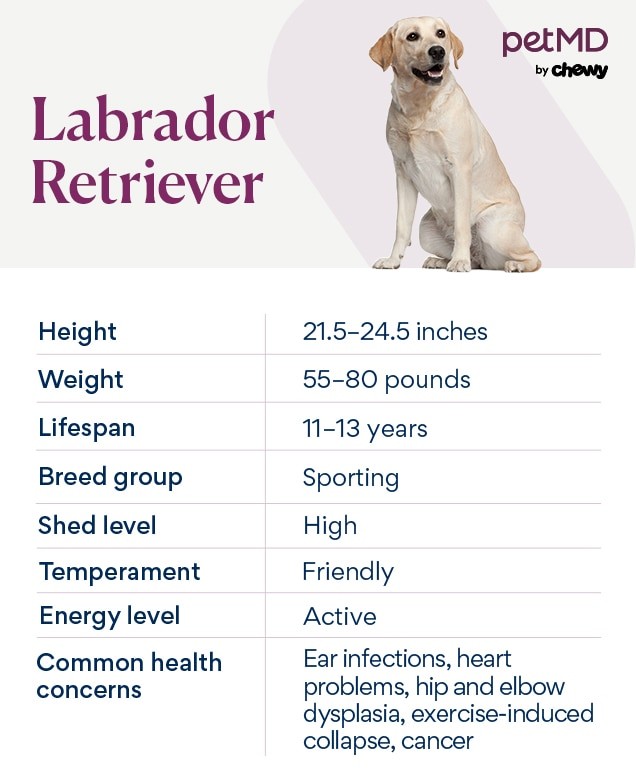The Labrador Retriever consistently ranks as one of the most popular dog breeds in the United States, and for many families considering a canine companion, the question “Are Labradors Good Pets?” is paramount. This article delves into the characteristics, care requirements, and potential health concerns of Labrador Retrievers to provide a comprehensive understanding of why they are often lauded as excellent family dogs.
What Makes Labrador Retrievers Great Family Companions?
Labradors have earned their esteemed reputation for good reason. Their inherent traits and temperament make them exceptionally well-suited to family life, contributing to their enduring popularity as pets.
Affectionate and Sociable Temperament
Labradors are renowned for their friendly and outgoing nature. They are typically affectionate towards people of all ages, including children, and generally get along well with strangers. This amiable disposition extends to other animals, making them compatible with multi-pet households, especially when properly socialized from a young age. Their eagerness to please and gentle demeanor make them ideal companions for families seeking a loving and inclusive pet.
Energetic and Playful Nature
Labs are sporting dogs, bred for retrieving and outdoor activities. This heritage translates into a naturally energetic and playful disposition. They thrive on activity and require regular exercise to stay happy and healthy. For families who enjoy outdoor adventures like hiking, swimming, or simply playing fetch in the backyard, a Labrador can be an enthusiastic and engaging partner. Their playful spirit also makes them wonderful companions for children, providing endless hours of fun and interaction.
Trainability and Intelligence
Labrador Retrievers are intelligent and eager to learn, which makes them highly trainable. They excel in obedience training and are often employed as service dogs, therapy dogs, and in search and rescue operations due to their trainability and willingness to work. This intelligence and trainability are beneficial for pet owners, as Labradors can be taught basic commands and household rules relatively easily, contributing to a harmonious home environment. Early socialization and consistent training are key to nurturing a well-behaved and adaptable Labrador.
Caring for Your Labrador Retriever: Essential Considerations
While Labradors possess many desirable traits, responsible pet ownership involves understanding and meeting their specific needs. Providing proper care is essential to ensuring a Labrador’s health, happiness, and well-being.
Exercise and Activity Needs
As an energetic breed, Labradors require a significant amount of daily exercise. Aim for at least an hour of physical activity each day, which can include walks, runs, swims, or play sessions. Engaging their minds with training exercises or puzzle toys is also important to prevent boredom and destructive behaviors. Adequate exercise not only keeps them physically fit but also helps manage their energy levels and ensures they are well-behaved members of the household.
Grooming Requirements
Labradors have a double coat that, while water-repellent and beneficial for outdoor activities, also means they shed considerably, especially during shedding seasons. Regular brushing, ideally two to three times a week, is necessary to manage shedding and keep their coat healthy. Occasional baths are also needed to maintain cleanliness, but over-bathing can strip their coat of natural oils. Attention to ear cleaning is also crucial, particularly for Labs who enjoy swimming, as their floppy ears can be prone to moisture buildup and infections.
Nutritional Needs and Feeding
Labradors are known for their love of food and can be prone to overeating and weight gain if their diet is not carefully managed. Feeding them a high-quality dog food formulated for large breeds is essential, and portion control is critical to maintaining a healthy weight. Dividing their daily food intake into two meals can aid digestion and prevent them from eating too quickly. Consulting with a veterinarian to determine the appropriate food type and portion sizes based on your Labrador’s age, activity level, and health is highly recommended.
Alt text: Three Labrador Retrievers of different colors – yellow, black, and chocolate – showcasing the breed’s color variations and friendly demeanor.
Potential Health Issues to Be Aware Of
While generally a healthy breed with an average lifespan of 11–13 years, Labrador Retrievers are predisposed to certain health conditions. Being aware of these potential issues allows pet owners to take preventative measures and seek timely veterinary care.
Common Labrador Health Concerns
Some of the common health issues seen in Labrador Retrievers include:
- Ear Infections: Their floppy ears can trap moisture, increasing the risk of ear infections. Regular ear cleaning is crucial.
- Hip and Elbow Dysplasia: These inherited orthopedic conditions can lead to arthritis and joint pain. Responsible breeding practices and maintaining a healthy weight can help mitigate these risks.
- Progressive Retinal Atrophy (PRA): An eye disease that can lead to blindness. Regular eye exams are important for early detection.
- Exercise-Induced Collapse (EIC): A neuromuscular condition causing weakness or collapse after intense exercise. Genetic testing can identify carriers.
- Centronuclear Myopathy (CNM): Another muscle disorder causing weakness, particularly in puppies. Genetic testing is also available for this condition.
- Tricuspid Valve Dysplasia (TVD): A heart defect affecting blood flow. Regular veterinary check-ups can help detect heart murmurs.
- Hemangiosarcoma: An aggressive form of cancer. Early detection is challenging but vital.
Proactive Health Management
Choosing a reputable breeder who screens their dogs for genetic conditions can significantly reduce the risk of inherited diseases. Regular veterinary check-ups, a balanced diet, appropriate exercise, and maintaining a healthy weight are all vital components of proactive health management for Labrador Retrievers. Being informed about breed-specific health concerns empowers owners to provide the best possible care and ensure their Labradors live long and healthy lives.
Are Labradors the Right Pet for You and Your Family?
Labrador Retrievers offer a multitude of qualities that make them exceptional pets for many individuals and families. Their friendly nature, energy, trainability, and devotion are hard to match. However, like any breed, they are not universally suited to every household.
Lifestyle Compatibility
Labradors thrive in active households where they receive ample exercise, attention, and interaction. They are best suited for families who can commit to providing daily walks, playtime, and mental stimulation. While adaptable to different living situations, they generally benefit from homes with yards where they can run and play. Potential owners should honestly assess their lifestyle and activity levels to ensure they can meet the needs of an energetic Labrador.
Commitment and Responsibility
Owning a Labrador Retriever, like any dog, is a significant commitment. It involves not only the joy of companionship but also the responsibility of providing for their physical, emotional, and financial needs throughout their life. This includes the costs of food, veterinary care, grooming, training, and other essentials. Prospective owners should be prepared for the time, effort, and resources required to raise a happy, healthy, and well-adjusted Labrador.
Conclusion: Embracing the Labrador Retriever as a Pet
In conclusion, to answer the question “are Labradors good pets?”, the resounding answer for many is yes. Their affectionate and sociable nature, coupled with their intelligence and trainability, makes them wonderful companions, particularly for active families. However, responsible pet ownership necessitates a thorough understanding of their needs, including exercise, grooming, and potential health concerns. By providing proper care and attention, you can unlock the full potential of a Labrador Retriever and welcome a loving, loyal, and joyful member into your family. If you are seeking a devoted, energetic, and trainable dog to enrich your life, the Labrador Retriever is undoubtedly a breed worth considering.

